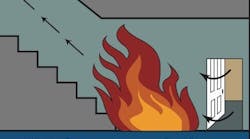Legal Lessons Learned: The Indianapolis Fire Department (IFD) thoroughly documented legitimate concerns about a female firefighter/paramedic's mental health, arising from her difficulties on EMS runs and her isolation from other firefighters at the fire station. The department did not violate the Americans with Disabilities Act (ADA) or her privacy rights by ordering her to undergo a psychological fitness-for-duty examination at fire departments expense, and requiring her to sign a medical release of information.
On January 15, 2008, in ____ v. Indianapolis Fire Department, et al., U.S. District Court for the Southern District of Indiana, 2008 U.S. Dist. LEXIS 3766 (we have deleted the name of plaintiff for this article), a U.S. District Judge in Indianapolis granted summary judgment to the fire department and several officers, and dismissed the lawsuit by a female firefighter.
The plaintiff has been on the Indianapolis Fire Department since 2001. From 2001 until July 2005, she was a "substitute firefighter" assigned on a rotating basis to various fire stations throughout the city. She is five feet tall "with shoes on" and in 2003 and 2004 several firefighters riding with her expressed concern about her driving of EMS vehicles on emergency runs. Firefighters claimed she could not reach the pedals of EMS vehicles without having the seat full up, seated right next to the steering wheel. The fire department directed each firefighter to document the concerns. In December 2003, her driving skills were formally evaluated by a female captain, who reported the plaintiff had passed and "did a good job."
In January 2004, another firefighter expressed concern that she was unsafe to ride with, since she could could barely see over the steering wheel, and that she hit a curb and was weaving. The firefighter was directed to document these concerns by the female captain who had conducted the earlier evaluation.
In March, 2004, plaintiff requested a meeting with the male firefighter, the female captain, and a chief officer. At this meeting, the female captain pointed out several concerns to the plaintiff (quotes are from pre-trial depositions), including:
- never "put bloody items near her mouth"
- "ask for help" when needed
- stop isolating herself from her crew, "eat with the firefighters, don't isolate yourself,"
- "inform your officer about a problem with another firefighter."
As a result of the meeting, the chief officer ordered a new evaluation of her driving skills (which she later passed) and also of her paramedic skills.
In April, 2004, the EMS duty officer expressed not only concerns about her EMS skills, but also her mental status. Regarding EMS skills, he documented her "inability to make decisions or even perform routine tasks on the scene of an incident without being told or prompted."
Regarding her mental well-being, he observed that the plaintiff spent a lot of time alone, was quiet, reserved, and a bit defensive. Other firefighters reported similar behavior to him. The EMS officer was also "mindful of the fact that two fellow firefighters committed suicide in the recent past."
Between April 9-12, 2004, plaintiff's paramedic skills were re-evaluated by a lieutenant, and he found serious concerns, particularly "her ability to handle patients with back pain/injuries." He also noted that plaintiff "spent most of her time in the women's area or with her husband, an [Indianapolis Police Department] officer, who would come by and had little interaction with other people in the firehouse."
Based on these reports, a battalion commander ordered plaintiff to undergo a psychological fitness-for-duty examination. On April 24, 2004, plaintiff visited with Dr. Deanne Barthlow, Institute of Public Safety Personnel, Inc., which performs examinations under contract with the city.
Plaintiff initially refused to sign the medical release form. The psychologist explained that the evaluation would not be performed without her release, so the fire department could be informed of conclusions. Plaintiff reluctantly signed it. Dr. Barthlow reported that she "feared Plaintiff's distrust of the department was being directed at her." Dr. Barthlow recommended six weeks of light duty, and evaluation by an individual therapist, and then a return visit.
On May 13, 2004, the battalion commander ordered plaintiff to go to the Employee Assistance Program (EAP) to speak with an individual therapist. Plaintiff attended three sessions, and was released back to Dr. Barthlow.
On June 21, 2004, Dr. Barthlow concluded that plaintiff "was making a conscious effort to be difficult" and also felt that Plaintiff may "be at risk for acting out on the job or during the course of a fire or EMS call." Based on these observations, Dr. Barthlow concluded the plaintiff was not fit for duty.
On July 22, 2004, plaintiff was referred back to the Institute of Public Safety Personnel, Inc., where she was evaluated by Dr. Jeffrey Savitsky, who concluded that she is still not fit for duty, but can go on light duty for three to four weeks.
On September 1, 2004, Dr. Savitsky met with plaintiff again, noted improvement, and returned her to full duty. The Indianapolis Fire Department returned her to full duty, and the court opinion did not mention any further problems until 2007.
In July, 2007, she had foot surgery due to a toe injury, and was placed on light duty. In August, she obtained a doctor's excuse to be off work from August 7-13, 2007.
She was ordered by the battalion commander to report to Dr. Steven Moffatt for a fitness-for-duty medical examination, per fire department policy requiring fitness for duty evaluations whenever firefighters are on medical leave for more than 10 consecutive days.
She refused to sign the medical release form, so Dr. Moffatt refused to perform the examination. The battalion commander met with the plaintiff on August 23, 2007, and he explained the necessity for a fitness for duty examination and medical release. She returned to Dr. Moffatt on September 19, but again refused to sign the form. Two fire department captains came to the doctor's office and ordered her to sign the medical release or face discipline. She refused to sign and was immediately put on light duty.
On September 24, 2007, she underwent her fitness-for-duty medical evaluation (presumably after signing the medical release) and was returned to full duty. She then filed this lawsuit, seeking an injunction and damages.
ADA: Job Related and Business Necessity
The Americans with Disabilities Act provides:
"A covered entity shall not require a medical examination and not make an inquiries of an employee as to whether such employee is an individual with a disability or as to the nature or severity of the disability, unless such examination or inquiry is shown to be job-related and consistent with business necessity." 42 U.S.C. 12112(d) (4) (A).
The federal District Judge had no difficulty concluding that the IFD had a job-related basis for ordering the psychological fitness-for-duty examination in 2004. The judge quoted from a Florida case, Watson v. City of Miami Beach, 177 F.3d 932, 935 (11th Cir. 1999), "In any case where a [fire] department reasonably perceives an officer to be even mildly paranoid, hostile, or oppositional, a fitness for duty examination is job related and consistent with business necessity."
The judge applied this case law to plaintiff, writing: "Plaintiff's position with the IFD certainly presents safety concerns, not only for the employees of IFD, but also for the public at large." "Plaintiff's assertion that [her three immediate officers] misunderstood Plaintiff's introverted behavior for depression is beside the point. The fact remains that [senior fire department officers] were faced with reports which question Plaintiff's ability to perform the essential functions of her job with the IFD. As officers of the IFD are charged with the safety of IFD employees and the public, they were bound to refer Plaintiff for a fitness for duty examination. Plaintiff's ADA claim therefore fails as a matter of law."
Right to Privacy Medical Release Form
Plaintiff also sued under 42 U.S.C. 1983, claiming the city violated her privacy rights by requiring her to sign a release of records from her meetings with the psychologists with the Institute of Public Safety Personnel, Inc.
The federal judge dismissed this claim, finding that the fire department has a right to require firefighters to sign a medical release form, whether for psychological evaluation or medical fitness to return to work. The court noted that while individuals have a "substantial" right to privacy in personal matters under the 14th Amendment, this right of privacy must be balanced against a "sufficiently strong state interest."
The Indianapolis Fire Department has a strong interest "in employing mentally healthy, effective, and proficient firefighters and paramedics" and this outweighs Plaintiff's rights to privacy. There is no evidence that the department disseminated any of her medical records to anyone who did not possess the specific authority to view them.
The court therefore refused plaintiff's request for a preliminary injunction, which would have prohibited the Indianapolis Fire Department from "requiring Plaintiff to sign any medical release forms" related to fitness for duty medical or mental examinations.
Conclusion
While the plaintiff may file an appeal to the U.S. Court of Appeals, this well written decision is helpful to the fire service. Clear message to fire departments: document; document; document.
LARRY BENNETT, a Firehouse.com Contributing Editor, is an attorney and the Deputy Director of Fire Science Education at the University of Cincinnati's Fire Science Department. He has been a volunteer firefighter/EMT for the past 27 years, and is the author of a new textbook, Fire Service Law. Larry writes a free Fire & EMS Law newsletter that can be read at the UC Fire Science web page To read Larry's complete biography and view his archived articles, click here. You can reach Larry by e-mail at [email protected].





